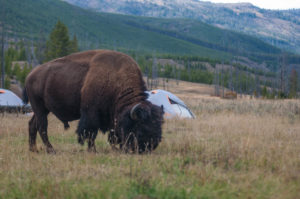 As ten of us sit in our open-air classroom by the banks of the Lamar River in Yellowstone, we find ourselves discussing the meaning of the word “wild.” In today’s society with our species management, massive irrigation projects, and other controls over the natural world, is there anything left that is truly wild? One student mentions the lack of wilderness left in National Parks. We notice a herd of bison grazing in the nearby meadow. Is Yellowstone wild or is it more of an outdoor museum with nature on display? Recalling the swarms of tourists in the information centers and the gawking photographers lined up on the side of the road, a ranger standing guard, making sure park visitors don’t get too close to a mama black bear and her cubs, we question how much of this place remains wild. Class pauses for a nature moment; the bison have moved from hanging out by our tents a few hundred yards away to one of them now grazing only about a hundred yards from class. We watch silently as the bison flops down, wallowing in a patch of dirt. Keeping a watchful eye on the approaching bison, we continue our discussion. The bison inches closer. Too distracted to finish our thoughts or sentences, we contemplate our next move. This bison clearly wants to hang out in our campsite, and who can blame him? Surrounded by mountains, a clear view of the river, shade from towering lodgepole pines, and a nice smoothed out stump, buffed from years of itchy bison backs. There isn’t a better place to be. Class ends abruptly as we gather our things, relocating to the edge of camp, watching the bison graze through camp, working his way over to rub his back against the old, smoothed out stump.
As ten of us sit in our open-air classroom by the banks of the Lamar River in Yellowstone, we find ourselves discussing the meaning of the word “wild.” In today’s society with our species management, massive irrigation projects, and other controls over the natural world, is there anything left that is truly wild? One student mentions the lack of wilderness left in National Parks. We notice a herd of bison grazing in the nearby meadow. Is Yellowstone wild or is it more of an outdoor museum with nature on display? Recalling the swarms of tourists in the information centers and the gawking photographers lined up on the side of the road, a ranger standing guard, making sure park visitors don’t get too close to a mama black bear and her cubs, we question how much of this place remains wild. Class pauses for a nature moment; the bison have moved from hanging out by our tents a few hundred yards away to one of them now grazing only about a hundred yards from class. We watch silently as the bison flops down, wallowing in a patch of dirt. Keeping a watchful eye on the approaching bison, we continue our discussion. The bison inches closer. Too distracted to finish our thoughts or sentences, we contemplate our next move. This bison clearly wants to hang out in our campsite, and who can blame him? Surrounded by mountains, a clear view of the river, shade from towering lodgepole pines, and a nice smoothed out stump, buffed from years of itchy bison backs. There isn’t a better place to be. Class ends abruptly as we gather our things, relocating to the edge of camp, watching the bison graze through camp, working his way over to rub his back against the old, smoothed out stump.
One topic we have been discussing this section of our semester is the idea of biophilia, a love or reverence for life, which stems from spending time outdoors and being in contact with nature. Similar to the idea of love, biophilia is fueled by active participants, good communities, and a respectful acknowledgement of differences, while understanding these differences do not lead to greater or lesser values. Biophilia focuses on the importance of cultivating a sense of place. Simon Weil argues that rootedness in a place is the most important and least recognized need of the soul. Without spending time in a place paying close attention to one’s surroundings with an intentional receptivity, it is difficult to cultivate a sense of place or biophilia.
Out here, we have been lucky enough to have our education, as well as our knowledge and understanding of place, impacted by direct experiences in the natural world. These experiences have allowed us to shape and cultivate our own environmental ethic and sense of biophilia. With all of us having these shared experiences, with daily discussions of these happenings, we have created a safe, caring community, striving for the same goal of understanding the world around us. Our experiences help us interpret life’s interconnectedness, fostering an understanding of nature’s interworking systems, in turn helping us to understand the systems in our everyday lives. Taking what we have learned from this semester, we hope that our experiences will help us develop what Stephen Harding calls ecosophies, or “evolving and consistent philosophies of being, thinking, and acting in the world that embodies ecological wisdom and harmony”.
After being corralled out of our campsite by that bison, some of us felt our views of what is wild needed reevaluation. Maybe some who visit the roadside attractions and information centers of Yellowstone, taking pictures out of their car windows, will see this place as a natural museum, but, for the small percent that stray away from their vehicles, fording the cold, turbulent rivers, sleeping under young lodgepole pines, they may see that within this place still lies the essence of the wild.